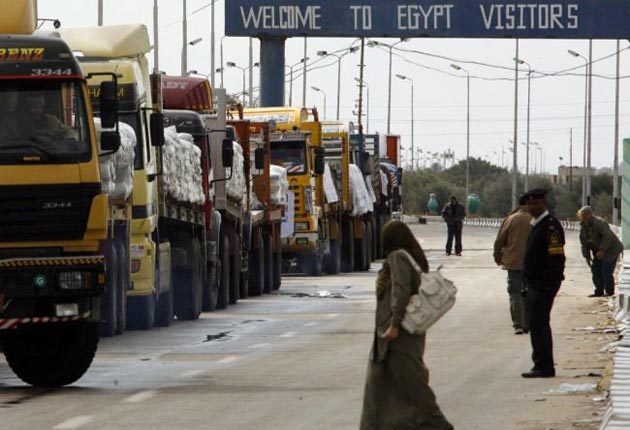Egypt softens stance on Hamas with move to open Gaza border crossing

Your support helps us to tell the story
From reproductive rights to climate change to Big Tech, The Independent is on the ground when the story is developing. Whether it's investigating the financials of Elon Musk's pro-Trump PAC or producing our latest documentary, 'The A Word', which shines a light on the American women fighting for reproductive rights, we know how important it is to parse out the facts from the messaging.
At such a critical moment in US history, we need reporters on the ground. Your donation allows us to keep sending journalists to speak to both sides of the story.
The Independent is trusted by Americans across the entire political spectrum. And unlike many other quality news outlets, we choose not to lock Americans out of our reporting and analysis with paywalls. We believe quality journalism should be available to everyone, paid for by those who can afford it.
Your support makes all the difference.A declaration by Egypt that it will permanently open its crossing into Gaza to ease the blockade on the territory has fuelled concerns in Israel about the future direction of Cairo's foreign policy.
Nabil al-Araby, Egypt's foreign minister, told Al-Jazeera that his country would take "important steps to help ease the blockade on Gaza in the few days to come", and described Cairo's previous decision to seal the border as "shameful".
Egypt has already eased restrictions on movement across the Gaza border since the fall of the Mubarak regime. But free passage of goods and people into Gaza would be seen as a major security threat by Israel, which has argued that even with Egyptian co-operation on blocking arms shipments, Hamas was able to import weaponry into the territory and would do more without it.
It is not clear how comprehensive the opening of the crossing at Rafah will be, but Mr al-Araby's remarks follow a spate of others indicating a potential shift in foreign policy which is being closely watched in Israel.
A senior Israeli official told The Independent yesterday that the government had raised concerns with Egypt about a series of indications from Cairo that it was softening the more hostile policy maintained by the former president Hosni Mubarak towards Iran and Hamas. Both are seen by Israel as enemies.
The official said that Egypt, which on Wednesday said it had brokered a draft accord between the Palestinian party Fatah and its rival Hamas, had tended to respond by taking "account of public opinion now and some of that opinion is opposed to you [Israel]".
The Israeli official cited a more emollient tone in Egypt's pronouncements about Iran and a new "lenience" towards Hamas, exemplified in part by its apparent unconcern about Hamas prisoners who escaped from Egyptian jails during the uprising in February.
Although a recent poll indicated opposition to the 1979 peace treaty with Israel among a majority of Egyptians there have been no moves to annul it. But Egyptian analysts and officials say that the country is reassuming the pivotal role it once performed in the Arab world which had been hampered by the country's close diplomatic ties to Israel. "We are opening a new page," Menha Bakhoum, a spokeswoman for the foreign ministry told The New York Times. "Egypt is resuming its role that was once abdicated."
Israeli officials said that it was unclear what Cairo intended to do in relation to the Gaza border crossing and argued that it would not be in the interests of Egypt to allow Hamas freely to import and export weapons into the already volatile northern Sinai district.
Israel is purportedly less concerned about Egypt's role in brokering a pact between Fatah and Hamas – which it has attempted several times before – than the relative secrecy of the negotiations. The latest breakthrough – the outcome of which remains unclear – came when Hamas told the Egyptians it was ready to do a deal with Fatah. The Palestinian President Mahmoud Abbas, who had previously said he would agree a pact if Hamas signed up to Fatah's terms, was reportedly only then informed about the talks between Cairo and Hamas.
While Egypt has indicated it wants normal diplomatic relations with Iran, it has also been at pains to reassure Gulf states that this will not come at the expense of their security. An Israeli official acknowledged that most of the shifts were so far ones of tone and rhetoric, rather than dramatic practical changes and added: "We have not yet seen the new Egypt."
Join our commenting forum
Join thought-provoking conversations, follow other Independent readers and see their replies
Comments